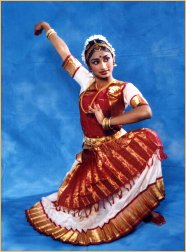 |
 |
Dedicated effort by Swathi by Vinod Menon e-mail: vinod_kumar_menon@yahoo.com
The melodic strains of raga saraswati on the flute flowed into the audience as I made my way in the dark to an empty seat in the near full auditorium. The occasion was the bharatanAtyam arangEtram of Swathi Reddy, student of Sushmita Arunkumar, herself a senior disciple of the famed Adyar K Lakshman. |
 |
| Sushmita
is the artistic director of nrithyAnjali in Naperville, IL. This
was the first arangetram held under the auspices of Nrithyanjali on August
30, 2003 at North Shore Center for Performing Arts in Skokie, IL.
A quick glance at the program revealed that I had missed the opening pushpAnjali and alArippu. A bright and cheerful Swathi performed the jathiswaram in rAgA saraswati, negotiating the changes in rhythmic structures with ease with a good araimandi stance. A shabdam, a rarely performed item these days, except in perhaps arangetrams, followed next. The Tanjore Quartet composition in rAgamAlika – “sarasijAkshulu” – with its interludes describing Krishna’s pranks gave ample scope to Swathi for displaying her skills in abhinaya. Papanasam Sivan’s varNam in the rAgA dhanyAsi, “nI inda mAyam”, in Adi tAla was the main piece of the evening. Swathi’s presentation of the varNam was marked by well-rehearsed execution of the jathis and excellent coherence between the lyrics and abhinaya. In arangEtrams,
especially in the United States, very often one finds the student not familiar
with the lyrics and hence a lag between the vocals and the hasta mudras.
It is to Swathi’s, and her guru’s credit that this rarely occurred during
this performance. Adherence to such details enhance the performance.
The arudi in the uttarAnga, intertwined with different postures
of Krishna, was an attractive variation. However, the transition from the
nritta to the abhinaya sections seemed abrupt. The
“nadai”(walk) that is so characteristic of the dance style was a
bit deliberate and not delicate. On occasion, the dancer has a tendency
to let her knees come forward while in the araimandi stance – particularly
noticeable when there is a shift from thattu mettu to other movements.
Continued practice and performance should easily eliminate these.
A simple, gracious speech by Sri Adyar K Lakshman, the chief guest, followed. The orchestra, guru and shishya were introduced and honoured. The program closed with the evergreen tillana in Hindolam, khanda eka tala. The highly coordinated orchestra consisted of Sushmita Arunkumar (nattuvangam), Bama Visvesvaran (vocal), Mayuram Shankar (Mridangam), Sugandhi Seshadri (Veena) and Venkatesan Ramani (flute). Bama’s singing of the varnam was especially melodious. Sushmita conducted the recital in an admirable manner with good control over the orchestra, giving complete support to the dancer. This was definitely
a performance that revealed the involvement and consistent effort put in
by Swathi and her guru. Hopefully this will be a first of many more performances
from this dedicated, promising dancer.
Vinod Menon is a dancer, musician and dance critic.
|